When Superman Was A Mutant
If I had a nickel for every time a comic was pitched with
the line, "Everything you thought you knew is a LIE!"
I'd be wealthy enough to start buying monthlies again (not
that I would). As plot springboards go, it's got even less
bounce left in it than most, but recently I realized it
goes back even further than I thought.
Consider the case of Superman 307-309, published
way back in 1976 (with cover dates of Jan-Mar '77), in which
writer Gerry Conway tried to convince us
-- and the Man of Steel himself -- that there never was
a planet Krypton, and that Superman and Supergirl
are actually Earth-born mutants. Aiding and abetting him
in this effort are artists Jose-Luis
Garcia-Lopez and Frank Springer.
It all started promisingly enough, with a fantabulous cover
in the "what's going on here" style of a Silver
Age classic, but delineated by the amazing Neal
Adams at the height of his Bronze Age grooviness:
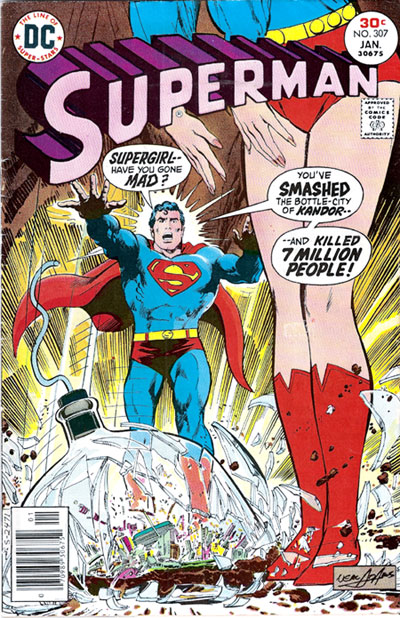
Inside, we hit the ground running, with Superman punching
apart the Metro Chemical plant while a mysterious, white-clad
superhuman called The Protector tries to
stop him. In a flashback, we learn that Clark Kent
was alerted to dangerous goings-on at the plant by a whistle-blowing
employee, and decided to investigate as Superman. Confronted
with accusations that vinyl chloride exposure is causing
cancer in the plant's workers, the owner shows a distinct
lack of concern, which sets Superman off on his tantrum.
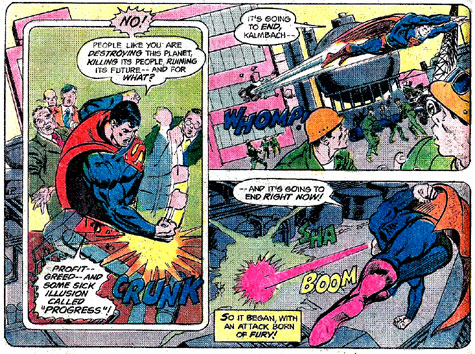
Yes, I know Superman is wearing pink booties in that panel.
Anyway, the Protector fights Superman to a standstill and
our hero goes off to sulk on a lonely hilltop, where he
unspools a bizarre chain of logic: plant workers dying of
cancer reminds him of everyone dying on Krypton. Krypton
was destroyed, therefore Earth is also on the brink of destruction.
Or something. Anyway, he goes off his nut and starts yelling
solemn oaths at the sky like he's in a Marvel comic, then
it's off on a mission to make the world greener.
First on the agenda is a supertanker full of oil (yes,
I know the chemical plant is the place where people are
dying, but it's 1976 and everyone hates the oil companies.
Not like today). Removing the crew, he lifts the ship into
the air. "In the past two years, there've been three
major accidents with these so called super-tankers,"
he thinks"...No more! I'm going to throw this baby
into orbit, and then come back for all the others!"
There's some sound reasoning for you. Never mind upsetting
the economies of the developed world, there's a one in 200,000
chance something might go wrong with this ship. Got to act
fast! Alas, the Protector shows up again (he kind of likes
what big business is doing to the economy), forcing Superman
to drop the ship (if it was ever going to have a breached
hull, this would have been the moment!) and again fighting
him to a draw before escaping.
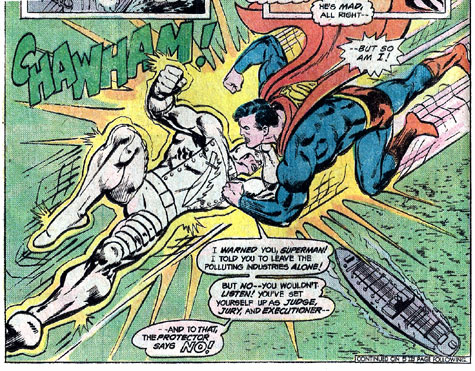
Supergirl shows up and tells her cousin to lay off the
ship already. Superman asks, "Do you want Earth to
end up like Krypton -- in ruins?" This gives Kara her
opening to deliver the big bombshell: "There is no
planet Krypton! Moreover, Clark -- there never was!"
Taking Superman to the Fortress of Solitude, Kara smashes
the statues of Jor-El and Lara
and tells Supes his "memories" of the planet are
a delusion. When he asks, quite reasonably, "What
about the Bottle City of Kandor?" which after
all is sitting right over there in the corner, she tells
him to take a closer look, and to his dismay the bottle
is revealed to contain only little toy buildings and plastic
figurines.
With that shock still settling in, Supergirl uses audio-visuals
to reveal their "true origins," claiming Jonathan
Kent and Fred Danvers were their
true biological fathers -- not just their adoptive dads
-- who as victims of radiation exposure sired mutant children.
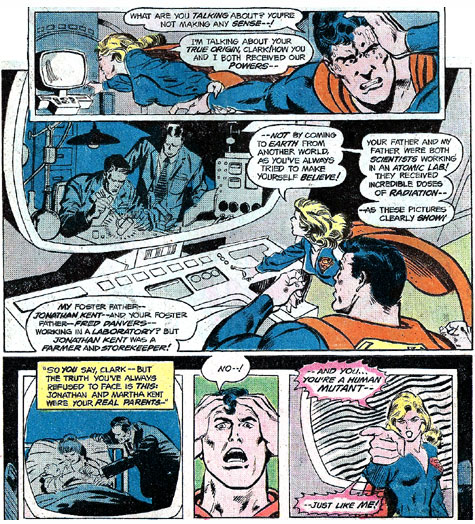
Adding to the hysteria, Superman's new nemesis The Protector
shows up again, this time smack dab in the middle of the
Fortress and ready for Round Three. Superman's figured out
the guy's tactics by now, however, and manages to knock
him out, but as the issue ends, our hero says gloomily,
"The nightmare isn't over! It's just beginning..."
Since I was never the type who could take a hint, I bought
the next issue, anyway. As if I could resist the second
phenomenal Neal Adams cover in a row:
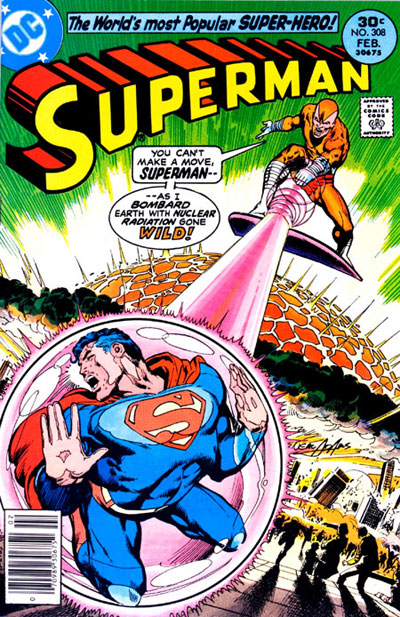
Still in the Fortress, Superman and Supergirl resume the
"Krypton versus No Krypton" debate while the Protector
wakes up and escapes. Oops.
Flying back to Metropolis, Superman keeps a date with Lois
Lane and begins warming up to the idea that he may be human
after all, deciding it may be time to get serious with the
lady reporter.
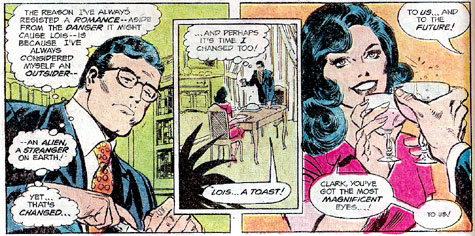
The next morning, Clark continues to struggle with Supergirl's
revelations, sorting thoughtfully through the Kryptonian
mementos in his secret closet, including a certain projector
we know and love.
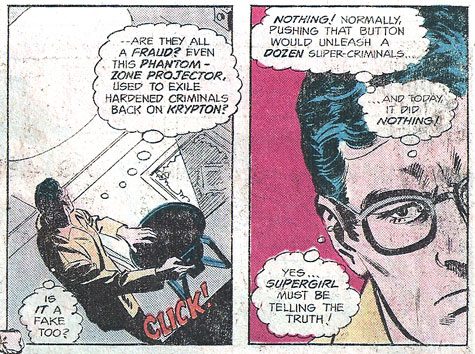
Hmm...let's see if this thing unleashes a dozen of the
most dangerous super-powered psychopaths in the Universe.
No, I guess not. Good thing, too, 'cause I'm still in my
pajamas. Hey, I wonder if that Kryptonian A-bomb I found
in a meteor once is non-functional? I'll drop it on the
Empire State Building just to be sure...
Some other stuff happens, then Superman battles Radion,
yet another new super-villain who's in league with the Protector.
Radion's even more into environmental destruction than his
pal; his plan is to overload a nuclear reactor and cause
devastating fall-out, triggering a nationwide radioactive
apocalypse from which a new race of mutants will emerge.
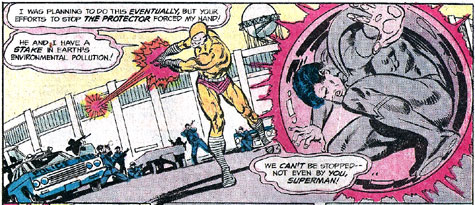
Superman maneuvers the Protector and Radion into knocking
each other out, but he shows some sympathy for them, noting
that they're all united by their common origin as genetic
aberrations. If only they'd used their mutant powers for
niceness instead of evil.
So it is that the wheels grind on to Part 3, and by now
I'm kind of committed to seeing this thing through. Sensing
this, DC feels it's safe to put Neal Adams back on the bench
and give me a Garcia-Lopez cover.
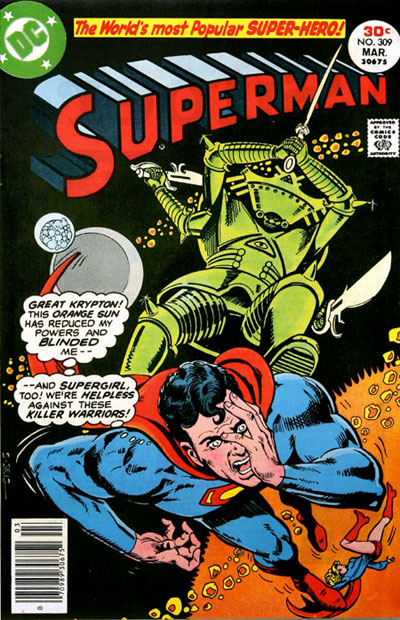
Within, we learn Superman is getting used to the idea of
being an Earthman and has dedicated himself to crime fighting
on the local level, to the delight of the authorities. Not
nearly as pleased with this development is Supergirl, who
needs his help staving off an alien invasion on a distant
planet; Superman turns her down flat. ""There
are enough things here on Earth to keep me busy," he
says, "I don't have to traipse around the cosmos."
Supergirl does not take the rejection well.
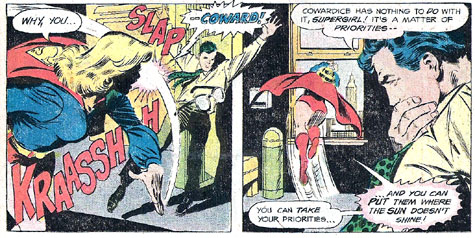
Clark goes on another date with Lois, but his mind is still
on his argument with Kara (or should I say "Linda").
He uses super-vision to watch Supergirl and Krypto
fighting that far-off space battle without him, and what
he sees isn't pretty; both of them fall in battle. Unable
to sit idly by any longer, he rudely rushes Lois out of
his apartment and speeds off to the far-off galaxy to join
the fray.
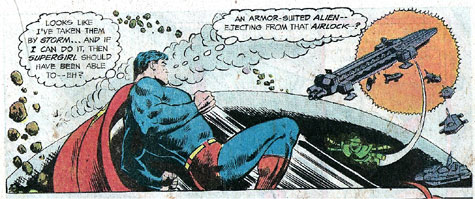
Check out that odd-looking spaceship at the upper right
corner of the panel. If it looks familiar, then you were
a kid of the 70s. Or maybe you just saw the toy ad that
ran nine pages earlier in this same issue:
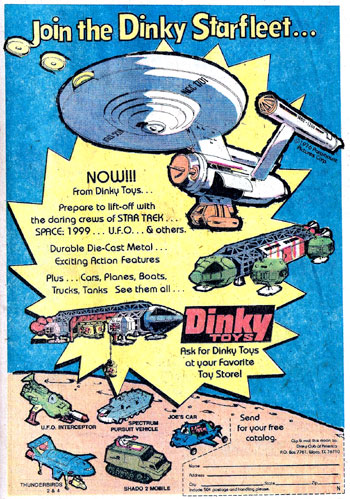
In 1976-77, Gerry Anderson's TV show Space: 1999
is enjoying popularity in syndication, which means the comics
have finally stopped ripping off Federation and Klingon
ship designs in favor of Moonbase Alpha's "Eagle"
craft. It will be a short-lived "victory" for
the show, however; in a few months, the summer of '77 will
be here and Star Wars will spark the next wave
of "creativity" in comic book spaceship design.
Okay, so Superman is doing very well in the battle until
he suddenly goes blind. This little setback leads to him
being knocked out by an alien warrior and locked in a cell
with Supergirl and Krypto, who have also gone blind due
to their proximity to an orange sun. With them is an alien
who fills them in on the enemy. In the course of the conversation,
Superman reveals that he's figured out he's not an Earthman,
after all.
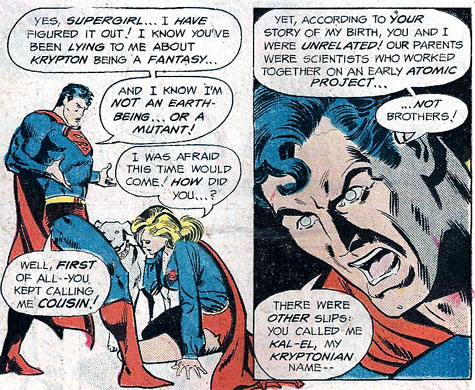

D'Oh! Yep, Krypto is pretty big hole in the theory, isn't
he? Let that be a lesson to you, Kara. You can't scam a
scammer. Superman was playing cruel hoaxes on people when
you were still playing with your Raggedy Ann dolls in Argo
City. Still, it did take him a long time to put it all together,
didn't it?
Never fear, it was all in a good cause, as Supergirl "explains:"
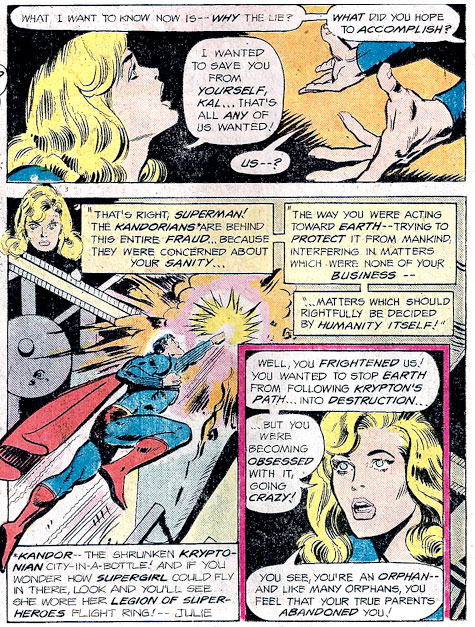
Supergirl reminds Superman that "Kandorian psychologists
-- unlike Earth psychologists -- feel that an emotional
problem should be removed, rather than solved!" Therefore,
if what's bugging Superman is his grief over the loss of
Krypton, the obvious cure is to convince him it never existed.
Because...um...then he only has to worry that he's been
living in a psychotic delusion for the last 30 years. See?
Problem solved.
Enraged that three months of his book and two great Neal
Adams covers have been wasted on this foolishness, Superman
smashes out of his cell and wipes out the enemy army in
spite of his blindness. Returning to Earth, he explains
that he loves his new world as much as Krypton.
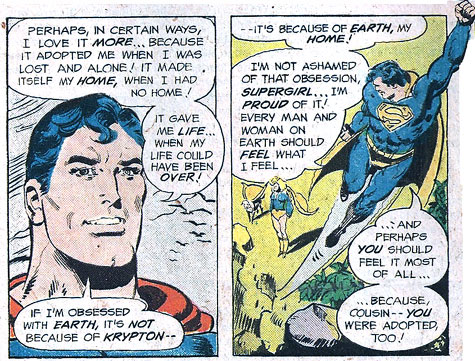
Wow, this one's a real mess, isn't it? Let's start with
the hoax: Kara and the Kandorians covered their bases with
a fake Kandor and Phantom Zone projector, but what about
the other evidence of Krypton's existence, like the recorded
messages and writings of Jor-El, the remains of Superbaby's
rocket, the super-costumes made of Kryptonian fabric and
-- here's a biggie -- the various forms of Kryptonite? If
he's not from Krypton, why does Kryptonite hurt him?
For Supergirl's story to be true, Superman would have to
accept that every time-traveling journey to Krypton of the
past, every visit to Kandor, every battle with the Phantom
Zone villains was the product of his imagination. And if
he does accept that, then logically his reaction wouldn't
be, "oh well, guess I'll get serious with Lois,"
it would be, "My God, I'm a raving lunatic! I need
to get off the planet before someone gets killed!"
Not that there would be any reason to believe it, mind you;
a quick trip to the Daily Planet files would confirm his
past battles with the Phantom Zone villains, or even better
he could just say, "Hey, Jimmy; am I crazy or didn'
t you visit Kandor a few times with me?'
The Kandorians' plan makes no sense, anyway. If what's
worrying them is that Superman is getting too obsessed with
saving Earth from ecological disaster, then why make him
think he was born on Earth? Wouldn't that make him more
obsessed with saving it, not less? Unless of course they
figure, "Hey, real Terrans don't care about the environment.
Maybe if Kal-El thinks he's from Earth, he'll stop caring,
too."
This is the biggest unresolved thread from the whole debacle:
Supergirl and the Kandorians honestly believe Superman has
gone off his nut with his attacks on the chemical plant
and supertanker. Nothing ever happens to convince them or
us otherwise. At the story's end, Superman says, "Well
if I am obsessed, it's because I care," which suggests
he still thinks he was in the right and fully intends to
pick up where he left off. And yet the issue never comes
up again. Superman never again attacks a coal mine or oil
well or polluting factory; his career as Super-Al Gore begins
and ends here. So apparently the episodes at the beginning
were an "amok time" for him, or should I say a
"berserker rage" in keeping with the mutant theme.
The story also illustrates the problems inherent in an
"activist" Superman. In his early years, he could
inflict all sorts of property damage on "unfair"
companies, "exploitative" bosses or "cruel"
governments and we cheered him on; he was a cartoon avatar
through which we lived out vicariously our wish for violent
justice. But by the 70s, we're supposed to believe comics
are more "mature" and "sophisticated,"
dealing with real-world issues and featuring realistic relationships.
In that light, Superman's actions here are blatantly criminal;
he's guilty of destruction of private propery and -- in
removing the supertanker's crew and seizing its cargo --
even piracy. There should be some fall-out from this; he
should be hunted by the authorities as surely as Spider-Man
(but in this case, deservedly). But of course he isn't.
What's more, his acts show the Kandorians were right: Superman
did lose his marbles, if only temporarily. Logically, what
can come of smashing chunks out of a chemical plant with
his fists and heat vision except a greater risk of environmental
contamination? (And unemployment for the workers) Don't
you imagine that supertanker is considerably more likely
to hit something and spill its oil now that it's sailing
around with no crew?
In 1976, when this story was written, the X-Men
were a few months into a successful revival engineered by
Len Wein, Chris Claremont and Dave
Cockrum, and in a couple years they would be the
the biggest thing in comics. Whether that influenced Conway's
story, I have no idea, but by the early 80s everyone would
be jumping on the "mutant" bandwagon, so maybe
we should praise Superman as an early adopter.
And hey, even if Superman isn't as cool and popular as
Wolverine, he's still the best there is
at what he does, Bub! By which of course I mean playing
elaborate hoaxes and mind games on other people.
















